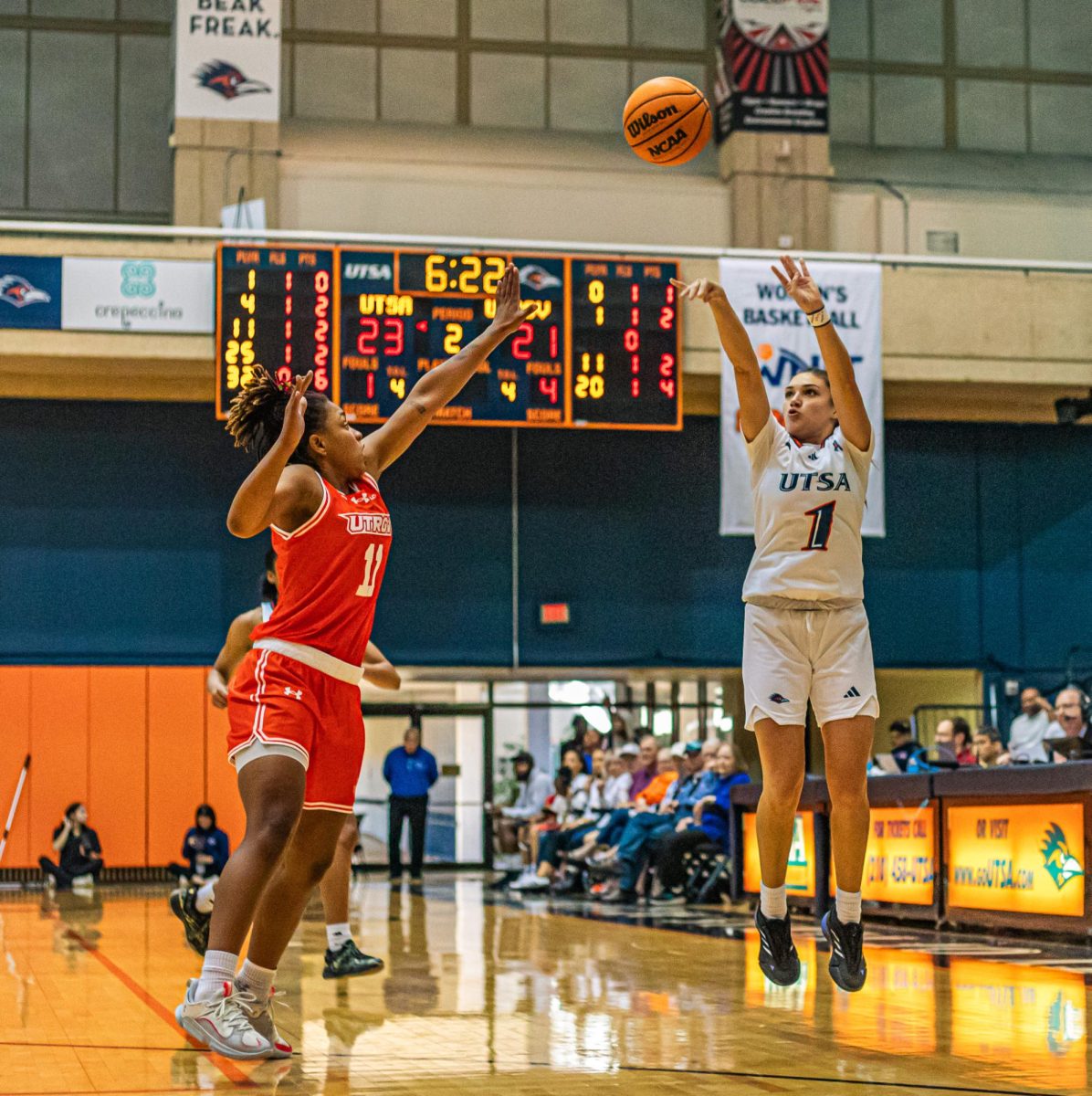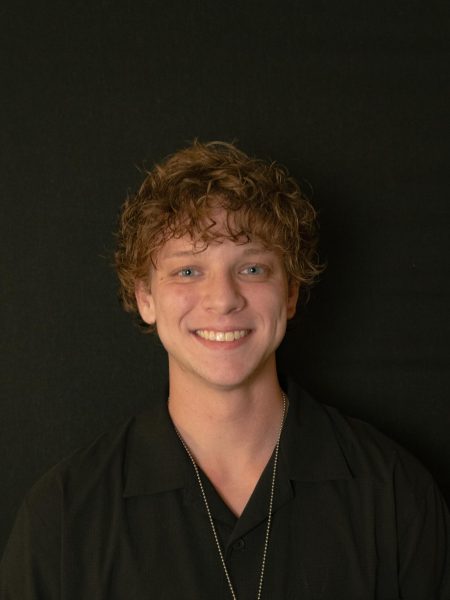Behind the main campus on UTSA’s very own rec fields is where you can find hookers, tackling and scrums all in one place and that’s with UTSA rugby.
UTSA rugby is not affiliated with the NCAA or the American Athletic Conference, they are club teams open to all UTSA students. Players pay fees to help fund purchasing jerseys and equipment, while the coaches volunteer their time to teach students rugby basics and the importance of working as a team.
This fall, both the men’s and women’s teams are playing rugby 15s. This means that each team will have 15 people on the field at the same time competing to put the ball behind their opponents’ line, known as the in-goal area.
Just like in American football, the ball can be passed from player to player or even poached by a player from the opposite team. However, one of the ways rugby differs from football is when the ball is passed to another player, it has to be handed off to a teammate that is behind them rather than thrown to one that is in front of them.
This factor alone gave reason for volunteer coach Peter Lewis to run a drill that involved a lot of running and sprinting.
“You’re only as fast as the slowest guy,” Lewis said.
The men line up on the practice field and take off, one after the other, passing the ball to a teammate behind them who sprints when he receives the ball. During a real game if you are the one carrying the ball then you are the one that is set to get tackled. The purpose of sprinting drills is to practice keeping up with your teammates as you attempt to carry the ball through enemy lines.
Brendan Bennett plays center for the men’s team, which he said “is basically like the running back for rugby.” Bennett spends most of practice outrunning everyone he is put up against. He notes that his position more often works to assist and does not usually make plays to score.
“Usually you’re starting the breaks, but you pass out to the wing, and they’re the ones that finish in score. Two weeks ago when we played Texas State, I picked up a fumble and I ran 95 yards to score. I stepped into the endzone staring at my defenders and that felt really good because we [dislike] Texas State,” Bennett said.
While the men practice speed, the women practice strength. During practices, the women usually practice scrums and tackling.
Eight-man Valerie Garza for the women’s team said that they were working on pods for the game. “We’re going to work on pods probably a lot today because pods are a big part of 15s.” Pods are a type of offensive group attack in rugby. After all, there is strength in numbers.
“You have two pods on the field, someone’s on one edge, ones on the other. That’s mainly a forwards position and the forwards will work a lot together, they’ll do mainly a lot of the tackling, and a lot of getting the ball and then passing it out. So we’ll work on that today because that’s probably the biggest thing that they’re confused on is getting up on the field. Once they get going, a lot of the girls are really fluent with it,” Garza said.
Tiffany Hunter plays the position of nine-man on the women’s team. “A nine is just like a ball carrier, kind of like a quarterback,” Hunter said.
Hunter feels that rugby is a great place to not only build your strengths but learn your strengths as well. Hunter wants recruits “To learn how strong they are, because I feel like a lot of women’s sports don’t really utilize that sort of down-and-dirty tackling. So I feel like you can learn your new limits and really get to test your strength and your mental strength. You can break the bounds of what femininity is. At the end of the day, I feel like it’s the perfect sport to do it.”
However, the women are not the only ones who enjoy the action-packed game of rugby. Dana “Reese” Francis, utility tackler for the men’s team said, “I enjoy hitting people. I like the tackling aspect of rugby so I enjoy playing forward. You know you get in on the action.”
Strength is a major component of any sport whether that be physical or mental strength. In a team sport like this, communication acts as another important factor. Datavian Shelvin plays the position of wing for the men’s team and says that the running drills are also about communication.
“To recognize the importance of communication and space and to recognize how we need to take away space from the offense on the defensive end. We say ‘three hard steps’ but that means to accelerate hard,” Shelvin said.
Communication is something that Garza would agree with. Garza is not only a player but a key recruiter for the team. Garza felt the need to rebrand rugby as a sport when trying to recruit people so that they would not be so hesitant to learn about it in the first place.
“It’s not as brutal as you would think,” Hunter said.
“We were getting told ‘no’ almost every time we went out because it was so terrifying to people so we had to work on that,” Garza added. “Recruitment-wise, I tried to rebuild the system of it because rugby is really intimidating to a lot of people. So we had to work on our whole spill of running it down and that it’s not as overwhelming as it seems and going through the structure of like, ‘You’re gonna be okay,’” Garza said.
Communication alone would not make a team great in any situation, what makes a team great is teamwork and players from the men’s and women’s teams found a sense of worth through the community they now share. In a team sport like this where you are tackling your teammates or grabbing drinks with an opposing team after a game, a community is bound to be formed.
Garza said that in the past she has felt that the team did not always act as a team but sees a difference in the dynamic because the team is more open to getting to know one another off the field as well as on the field. She now encourages the women to arrive to practice an hour early so that recruits can ask the veterans questions and learn skills from them as a means to bring the team closer together. “We’re a community that will work with you and we’ll make it more comfortable for you.”
Michael Parazo, hooker for the men’s team wants more students to feel welcome to join as well. “If you’re interested at all and playing a sport and you don’t think you can play football or any other sport, just come play rugby. We are a club team. Ultimately, we want guys to have fun and enjoy the sport more than to put themselves through the sport,” Parazo said.
Eight-man for the men’s team, Sinjin Ramirez, said he felt welcomed to UTSA only after joining the rugby team. “It’s just a big family. So when I came here, I didn’t know anybody. I joined the team and everyone welcomed me with open arms and it’s honestly the favorite sport I played. I’ve played baseball, football, basketball and nothing has beaten rugby, honestly. I’m going to continue to play for as long as I can, but I’m really happy that I joined them.”
Captain of the women’s rugby team, Adrianna Jennings said that the community that comes with joining a rugby team is what she loves most about the sport. “Rugby in America is small but if you go outside into the world, it’s a huge thing. With the World Cup going on, everybody’s super interested in that. I thought it was cool that when I wear my rugby T-shirt to the airport when I’m going home and people see it they’ll ask me about it.”
“So I think the community and the people you meet are really cool, that’s something I never experienced with any other sport. I think that every position has a place on the field and everybody has a place on the field,” Jennings said.
Since the men’s rugby World Cup is currently still in its group stage, some of the players had opinions and hopes about which teams within the rugby community would prove to be winners in this year’s World Cup.
Hunter is rooting for Japan since her mom is from there. “I’m going to be honest, I think an underdog is going to win this year. Not Japan, though. I think it might be like France or Italy, something that we’re not expecting,” Hunter said.
Francis said he is rooting for Ireland to win but thinks Fiji will prove to be “the dark horse” of the cup. “I’m rooting for my men in green. I’m hoping for Ireland to win but I’ve been watching Fiji. They’ve been playing like it’s their last game ever. So I’m recognizing that and they can shock some people.”
Overall it doesn’t matter who wins, it is the camaraderie the rugby community possesses that makes this sport worth supporting. If you’d like to join or watch the games you can reach out to them through their Instagrams @utsa_rugbyw for the women’s team and @utsamensrugby for the men’s team.















